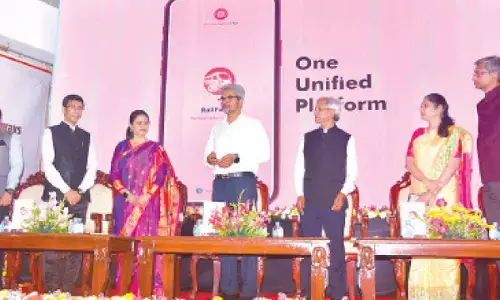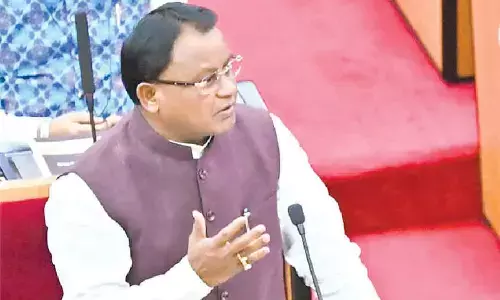The Future of MSMEs: Embracing Innovation and Sustainability for Growth

The Future of MSMEs
India’s MSME sector is rapidly transforming, driven by technological innovation, changing consumer needs, and robust government support.
The MSME sector in India is evolving rapidly, shaped by technological advancements, shifting market demands, and government-backed initiatives. As businesses face both opportunities and challenges, it’s crucial for entrepreneurs to stay adaptable and proactive in adopting new trends. In an exclusive conversation with The Hans India, Suresh Mansharmani, Co-Founder, Tajurba Business Network, discusses the key trends shaping the future of MSMEs, the critical steps for growth, and how entrepreneurs can leverage available resources to thrive in an ever-changing environment.
1. The MSME sector has seen significant shifts in recent years. What trends do you think will define the future of MSMEs in India, and how should entrepreneurs prepare to stay competitive?
The Indian MSME sector is undergoing a major transformation, driven by advancements in technology, changing customer expectations, and government initiatives. Entrepreneurs must adapt to these shifts to stay competitive. Key trends shaping the future include digital transformation, where MSMEs must embrace digital tools, such as e-commerce, to expand into new markets with minimal costs.
Access to credit remains a challenge for MSMEs, but financial inclusion efforts and alternative lenders are bridging the gap, offering more funding options. Additionally, growing awareness of environmental issues is prompting MSMEs to adopt sustainable and green practices, attracting eco-conscious customers while reducing environmental impact.
2. IPOs can be a game-changer for MSMEs. Could you walk us through the critical steps you advise businesses to take when preparing for an IPO, especially in a challenging market environment?
An IPO is a key milestone for MSMEs, offering capital and credibility, especially in tough market conditions. To navigate this process successfully, MSMEs must ensure financial stability, healthy cash flow, and address any internal financial issues. Compliance with SEBI regulations, transparency in financial statements, and clear risk disclosures are crucial for gaining investor trust. Additionally, effective risk management strategies and contingency plans are necessary to mitigate potential market and operational risks.
A fair, data-driven valuation and appropriate pricing are vital for attracting investors, while strong corporate governance structures, such as an independent board, further enhance credibility. Crafting a compelling narrative that highlights the business's value proposition, growth trajectory, and market positioning, along with a well-executed prospectus and roadshows, can help engage potential investors, even in a challenging market.
3. How do you see OKRs (Objectives and Key Results) transforming the landscape for MSMEs?
OKRs are becoming increasingly important for MSMEs, providing a structured approach to goal-setting that enhances clarity, focus, and accountability. The framework helps teams align around shared objectives and transparently track progress through measurable Key Results. For MSMEs, OKRs act as a motivational "North Star," rallying employees behind a common vision while breaking down ambitious goals into actionable steps.
The primary benefit of OKRs for MSMEs is the alignment it creates, ensuring everyone from top leadership to employees works toward common objectives. This promotes accountability and responsiveness to change. However, challenges like training employees unfamiliar with goal-setting frameworks and balancing ambitious yet attainable objectives must be addressed. When implemented effectively, OKRs help MSMEs improve productivity, agility, and competitiveness in a rapidly evolving business landscape.
4. With multiple government initiatives aimed at supporting MSMEs, which ones do you feel are most beneficial, and how can business owners navigate these resources effectively?
The Indian government offers several schemes to support the growth and stability of MSMEs, providing critical resources such as financial subsidies, training, and infrastructure support. Since 2008, District Industries Centres (DICs) and banks have distributed significant funding through schemes like the Margin Money subsidy, helping create millions of jobs. MSME owners can benefit by approaching local DICs for access to these resources and guidance on various government initiatives.
Additionally, programs like the Raising and Accelerating MSME Performance (RAMP) launched in 2022 aim to accelerate growth, improve market access, and support technological upgrades and sustainable practices. MSME owners can leverage RAMP for competitiveness, international market expansion, and improved access to finances. By aligning these initiatives with their business needs—such as technology upgrades or green practices—entrepreneurs can strengthen their operations and position themselves for long-term growth.
5. What advice do you have for young entrepreneurs who are just starting, especially in today’s highly competitive environment?
Success in entrepreneurship is rooted in a foundation of curiosity and a willingness to learn. This adaptability helps navigate challenges, while strong communication and salesmanship build trust and relationships. Empathy and respect for others' viewpoints are also crucial for fostering teamwork. Financial responsibility is key, as securing funding should aim toward building a profitable, sustainable business rather than relying on successive rounds of investment.
A solid learning foundation, including skills like communication, financial literacy, and market trend understanding, is essential for long-term success. Entrepreneurship requires resilience to overcome setbacks, viewing failures as lessons rather than obstacles. Surrounding yourself with a network of skilled, goal-oriented individuals, such as mentors and peers, accelerates growth and provides valuable support, helping entrepreneurs refine their vision and approach.











